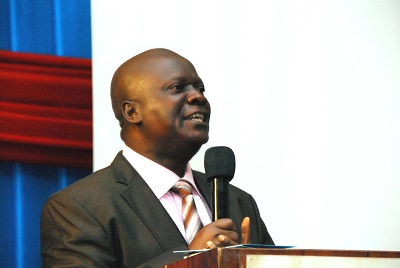Why The CGC’s Conference Is Imperative Now – Nweke

An encounter with Dr. Eugene Nweke, head of research at Sea Empowerment Research Center leaves you with no doubt that he’s versed in knowledge and expertise on the operations of the Customs, the maritime sector and its value chain, especially freight forwarding. He was recently the president of the National Association of Government Approved Freight Forwarders (NAGAFF). In this interview with Fortune Ulu, Dr. Nweke offers his valued views on position of some pertinent issues.
Excerpts:
We want you to do a preview of the Controller General of Customs (CGC) conference, its impact on trade facilitation over the years.
Trade facilitation is a deliberate measure taken to ensure that the process of clearing products is simplified and harmonized. If you’re an operational person, you can take this definition and marry it with what we have on ground. Because the CG understands that the definition has not matched what is operational, that is why the CG has taken the bull by the horn, has put in place a team headed by Comptroller Dera Nnadi of Tin Can Island Customs Command. They have over time reviewed the system, found out what are the issues, by way of trying to manage the duration or stay of SGD (single good declaration), from the port.
We will get a breakdown on this at the conference. The CGC in order to bring about the technical aspects of the job, which is looking at a trade facilitation to simplify it, has gone ahead to partner with China. China is our highest trading partner when it comes to solid minerals. So he has started what is called AR, Advanced Ruling concept.
Then he has also gone ahead to kick- start the implementation of AEO, that is, authorized economic operator. This is authentication for a compliant trader to exploit because trade facilitation can only be accorded to legitimate importation. Legitimate importation are those trade or importation that have not compromised necessary trade guidelines of the nation. So those trades deserve to be accorded trade facilitation treatment. It does not accord facilitation to illegitimate importation, because illegitimate cargo does not only evade duty and so many issues, so no Customs will accord or facilitate illegitimate trade. Trade facilitation is only limited to legitimate trade that have complied with laid down rules, and that is why Customs is trying to pencil down those people that have complied to give them authorized economic status, so that their goods will be given advanced standing. If you are not under compliance, I think, it will push you to red light, that is, physical examination. Customs is determined to preach to some of them and say gentleman, why not comply, so that we can move some of you from flag status, to green status or even yellow status?
Can we now move on to the issue of the huge revenue being recorded by the Customs commands? Is this a function of high exchange rate or a reflection of tariffs on trade realities?
It’s the combination of both. The Customs area commands over time in their system shortlisted those who are compliant traders. So every non-compliant trader is subjected to high level scrutiny of risk assessment level. With proper 100% examination, we found out that several of them have actually taken their classification from 20% to 0%, so Customs needs to do the needful in order to get back lost government revenue.
On the other hand, the poor performance of naira-dollar exchange rate is an issue. It’s a factor, because every day, the exchange is soaring higher and higher, and it’s not going down. We now have a system where government issued a policy to the CBN which has made it possible that, other than giving what is called a regime exchange rate, we don’t have it like that. Before whether the exchange is doing well or not, when it comes to Customs revenue exchange rate for converting foreign currency to Naira, it used to be periodical. The exchange rate today is daily, whatever. It used to be a regime. But today there is no more tariff regime.
The Federal Government claims that the move to rejig Customs, NIMASA and other agencies revenue stream is not an attempt to take away their revenue functions. What is your take on this?
Well, most time, government of the day will always try to listen to people who are called army of occupation. They are all over the places. They parade themselves as consultants, revenue administrators and what have you. It takes a president and leadership of the nation that has zero tolerance for corruption and has high level regard for national integrity and advocacy to act differently in the midst of some of the shylocks, we call the army of occupation.
It is only Nigeria that we wake up one day and the government, in order to hide their scandals, declare that they don’t have capacity to run public enterprise. The same enterprises that were managed by our forefathers, and bought them to the level that some of them met them. Then, in their own time, they said they cannot manage public enterprise. If you go to the great economies of the world today, they will never compromise public enterprise. They manage it effectively, then allow the private sector to also compete side by side. That is the shorter way to the development of any nation. Now, they outsource everything that’s supposed to be manned by well-trained Nigerians, to private individuals who will always say they want to get more revenue; getting more revenue at the detriment of your people, because they will always go by way of commission.
In your view, are the Lagos ports still congested? Are the Customs and others facilitating fast and easy clearance of goods from the ports?
But your colleagues have been reporting about port congestion, and NPA has never denied that there’s no port congestion. Are they not the landlords of the port?
Freight forwarders are saying there is port congestion. Everybody is suffering. Queues are returning back. There are different type of congestion. Congestion is when the dwell time, waiting time of vessel at Takwa Bay will have access to come and discharge and those occupying the place are there more than is necessary. And the more they stay longer there, the more they also find a way to recover their expenditure, because vessel is a beautiful bride. She incurs cost as time passes by. Port activity is also about cost? So if you don’t provide natural energy source for them to propel the port, but with the diesel, then the running cost will be high, it is not a rocket science. These are simple port logic that everybody knows.
So the other type of port congestion, if the number of, we call it fast production, the time that a ship should have used to discharge, and stays longer, because there’s no space in the parking area, then there is problem. A ship from another port may occupy it with empty containers that have not been exported. So the place they have is not enough to encourage smooth production. Then if, for instance, more containers are not going out, and more are coming, it is another condition. The first type of congestion is a congestion whereby the access road is not visible, then the traffic comes in. It’s also congestion on the port access corridor. That is also another type of congestion.
In the face of all this, the congestion, what do you think needs to be done?
It is for the Nigerian Shippers Council to assume its regulatory role. We pray that the President will consent so that the Council takes over the economic regulatory function effectively under the new agency posture.
Somebody must play the role of an ombudsman. So what is happening here is more or less, technical and administrative.
So it is the role of the Shippers Council, which will assume an economic regulatory function to address some of these issues. There’s nowhere in the world without a person or entity operates in a vacuum. There must be an economic regulator that will address these issues because there is what is called performance indicators, if the indicators are always negative, somebody must say, my friend, I will remove your license. I will suspend your operations; they will sit up.
Can you say the concession of the ports has really panned out well?
I’ve written so much in seminars, post concession, pre-concession. The way it is, everybody will appreciate that concession has made reasonable impact but can we quantify it in terms of revenue or wellbeing of the nation. If we can look at it, can we score it from 0 to 100 or 60 or 70? So, post concession, yes. We don’t need to go back to the former era but the cost component how far? Are the concessionaires making more money for themselves, and less to the country? Or even in the structures, are they putting up super structures as agreed in the concession agreement?
Concession should be a good thing. I think that we are still progressing. But we are not yet there in terms of the envisaged benefits of port concession. If you compare the statistics that compelled government to concession the ports, we are not there yet.
You recently called on the minister of marine and blue economy to take steps to reposition the CRFFN. Would you now say that the recent appointment of a registrar for the council is a step in the right direction?
I’m going to say yes because a freight forwarder has been appointed as the registrar.
If a professional has been made a registrar, then those who will go into the governing council should also be professionals. Give us less of politicians and the institutions or agencies that will add more value to us. So the good thing is when we say the structure, the structure also means that there are certain amendments that need to be made to the Act 2007. So the minister should be holistic and committed to doing it. The local driver of this value chain is the logistics provider. If you continue to use policy to whittle or make their link weak, it will affect every other person.







